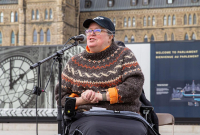Support strong Canadian climate journalism for 2025
A First Nations woman told a courtroom she was left scared and sick to her stomach after a priest allegedly assaulted her at a residential school more than 50 years ago — accusations the now-retired cleric has denied.
Arthur Masse, 93, is charged with one count of indecent assault from when the woman was a 10-year-old student at the Fort Alexander Residential School, north of Winnipeg.
RCMP charged Masse last summer following a criminal investigation that started in 2011. The tall, slender man with thinning hair and glasses quietly entered his plea of not guilty as his trial began Tuesday. He was wearing all black and a priest's collar.
Victoria McIntosh was the first to testify at the two-day, judge-alone trial overseen by Court of King's Bench Justice Candace Grammond.
Wearing a gold ribbon skirt and a beaded medallion, McIntosh swore on an eagle feather after she took the stand. An eagle feather staff from her community of Sagkeeng First Nation was placed at the front of the courtroom to provide her with strength from the First Nation and her ancestors. The community's chief and council, as well as family members, attended the trial in a sign of support.
GRAPHIC WARNING: The following details may disturb some readers.
McIntosh testified she was in the bathroom at the school when she heard someone enter. She said she recognized it was Masse because of his collar. The priest then opened the stall door, she told court.
"(Masse) came in," she recalled before taking one of a few long pauses during her roughly two-hour testimony. "He picked me up. He tried to fondle me and he tried to kiss me. Well, he actually did."
"I was scared and nauseated at the same time. I slipped away from him and I ran out of there."
She said the alleged assault lasted approximately a minute, during which Masse used one of his forearms to hold her against a wall while he used his other hand to "fondle" her above her clothing.
"It just happened so quick. I just felt him there and I was terrified," said McIntosh.
Before she was able to get away, McIntosh said Masse kissed her quickly and roughly on her face.
"He said: 'Don't say nothing,'" said McIntosh.
The Canadian Press doesn't typically name complainants in such cases, but McIntosh has said she wants to speak publicly and no publication ban was ordered.
Following the alleged assault, McIntosh said she avoided Masse and did not speak with him. The first time she reported the alleged assault was to police in 2015.
RCMP received allegations of sexual abuse at the Fort Alexander Residential School at the beginning of 2010. Officers conducted archival research and spoke to more than 700 people across North America with the hope of locating possible victims or witnesses. In total, police obtained 75 witness and victim statements.
Police said the alleged assault took place sometime between 1968 and 1970.
George Green, Masse's lawyer, suggested during cross-examination that memory fades over time and questioned how McIntosh could be certain the person who assaulted her was his client.
McIntosh said for many years following the assault, she tried to forget Masse's name and what happened until a 2013 meeting regarding a residential school settlement claim triggered memories.
"Prior to 2013, you forgot what his name was?" Green asked.
"Yes and no," McIntosh responded. "I didn't want to say his name."
Masse spent most of his career working with Indigenous communities in Ontario and Manitoba before retiring in 1999. During his own testimony, Masse recited the names of many students and staff he worked with throughout the years before adding he did not recall having any interactions with McIntosh.
He told the court he did not follow students into the bathroom or touch students inappropriately. He denied McIntosh's allegations outlined on Tuesday.
"Did you ever try to kiss Ms. McIntosh like she's alleging?" Green asked his client.
"No, definitely not," Masse responded.
Outside the courthouse, McIntosh told reporters there is "no doubt" in her mind Masse was the one who assaulted her.
"I remember the grin. We remember details like that when it's so horrible," she said. "You never forget those details. You never forget those faces."
Masse and his lawyer declined to speak after the trial wrapped for the day.
Closing arguments are expected Wednesday.
The Indian Residential Schools Resolution Health Support Program has a hotline to help residential school survivors and their relatives suffering trauma invoked by the recall of past abuse. The number is 1-866-925-4419.
This report by The Canadian Press was first published March 7, 2023.




Comments